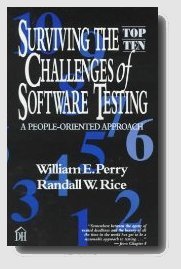e-Learning Format
 This course is designed for software testers that want to go deeper than the basic concepts. You will learn how to create an effective test strategy, how to design creative test cases, how to optimize test cases to get the most testing from the fewest number of cases and how to measure and report the results of testing.
This course is designed for software testers that want to go deeper than the basic concepts. You will learn how to create an effective test strategy, how to design creative test cases, how to optimize test cases to get the most testing from the fewest number of cases and how to measure and report the results of testing.
This is a subset and combination of two courses: Intermediate Software Testing and Innovative Software Testing Approaches.
You will leave this course with a solid foundation for testing in situations which are very diverse and dynamic.
This course is centered around a common case study which builds throughout the course.
Intermediate Software Testing Techniques will help you reach the next level in your testing skills. You will emerge from this session knowing how to plan and conduct tests in diverse and complex environments.
This course will build on basic testing principles and introduce new methods to teach testers how to:
- Develop test scripts and test cases using a wide variety of techniques
- Create decision tables
- Get the most testing from the least number of test cases
- Track and control test scripts and cases
- Assess risk from the project, technical and business perspectives
- Test analysts
- Testers
- Test engineers
- Software developers
- Project managers
- Test lab managers
- QA analysts
This course requires basic testing knowledge or experience.
Module 1- ISTA - Intermediate Test Design Strategies
- How Much Effort Should Be Dedicated to Test Design and Types?
- Tests by Type of Project
- Test Case Economy
- How to Match the Test to the Project and Test Stage
- Rules for Test Applicability
- Producer Testing
- Customer Testing
- Automated Test Strategies
- Test Cases
- Test Case Types
- How to Document Test Cases
- Organizing the Test Cases
- The Decomposition of Test Cases from Test Objectives and
- Functions
- A Test Case Design and Tracking Tool
- Sample Test Cases
- Test Case Best Practices
- How to Be Creative in Test Case Design
- Types of Test Cases
- Functional Test Cases
- Structural Test Cases
- Regression Test Cases
- Security Test Cases
- Performance Test Cases
- Interoperability Test Cases
- Compatibility Test Cases
- Portability Test Cases
- Usability Test Cases
- Scalability Test Cases
- End-to-end Testing
- Batch Test Cases
- Conversion Test Cases
- Link Test Cases
- Browser Test Cases
- Exploratory Testing
- Parallel Test Cases
- Vendor Test Cases
- Test Cases by Phase
- Unit Test Cases
- Integration Test Cases
- System Test Cases
- Acceptance Test Cases
Module 2 - UATD - Risk-Based Testing
- What is Risk?
- The Nature of Risk
- The Three Views of Risk
- The Elements of Risk
- Risk Assessment
- Why is Risk Assessment Important?
- Computer System Risks
- Three Views of Project Risk
- Assessing Technical RisksAssessing Business Risk
- Likelihood of Failure
- Impact of Failure
- A Sample Risk Chart
- Practical Application
- Ways to Apply the Results
- Example: Applying the Results
- Sample Business Risk Chart
- How Can This Information Be Used?
- When is Testing Complete?
- A Problem in Risk-Based Testing – Cases that Span Risk Levels
- When is Risk Assessment Performed?
- Who Performs Risk Assessment?
- Who Owns Risk Assessment?
- Additional Resources
Module 3 - UATD - Regression Testing
- What is Regression Testing?
- No Regression Testing: Hidden Defects
- Regression Testing: No Hidden Defects
- Regression Testing - The Process
- Regression Testing - What’s Needed?
- Regression Testing Issues
- Regression Testing - How Much is Enough?
- Regression Testing of Complex, Integrated Systems
- Tips for Performing Regression Testing
Module 4 - INVD - Scenario-based Testing (workflow, use cases, etc.)
- What is scenario-based testing?
- How to find and/or define scenarios?
- Defining test cases from use cases
- Combining data with scenarios
- Controlling scenario-based testing
- Experience: Designing a scenario-based test
Module 5 - INVE - Requirements-based Testing
- What is requirements-based testing (RBT)?
- What’s needed?
- How RBT is helpful
- Designing tests based on decision tables
- Experience: Designing tests based on a requirement
Module 6 - Summary
- Top Course Points
- Course evaluation



